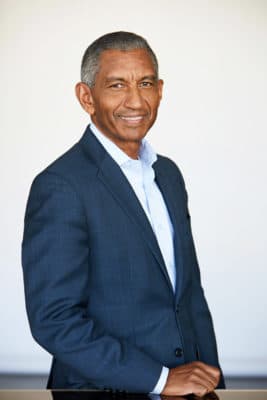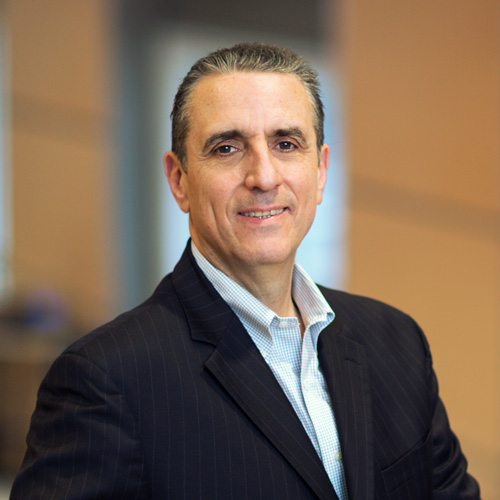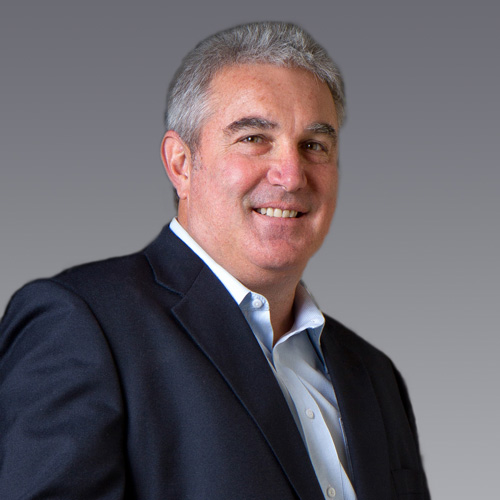
“My grandmother couldn’t read or write, but the lessons I learned from her have stuck with me throughout my life,” Juan Figuereo says. “My work ethic, leadership style, the way I relate to people that I’ve refined overtime—they mostly originated from her.”
Figuereo was raised by his grandmother in Santo Domingo, Dominican Republic, and he remembers to this day the stories she told on their walks to the market. Morals of those stories were lessons like “listen to everyone, because everyone has a story,” and “there are no small people in this world.” He had no way of knowing then how well her advice would serve him in business, in an international career, and at the boardroom table.
Following eight years in public accounting at Arthur Andersen & Co. early in his career, Figuereo worked his way up through nine different positions over fifteen years at PepsiCo, about half with Pepsi and half with Frito Lay. In that time, he and his family moved eight times—places including Rio De Janeiro, Brazil; São Paulo, Brazil; Barcelona, Spain; and London—which provided invaluable international perspective of business and culture.
Then came four years as head of mergers and acquisitions for Walmart, where Figuereo gained significant exposure and access to China and its trade marketplace. Following Walmart and a succession of roles as CFO for three other Fortune 500 companies (NII Holdings, Cott Corporation, and Newell Rubbermaid), Figuereo accepted his current position as CFO of Revlon Consumer Products Corp. in April 2016.
During his time at Newell Rubbermaid, C-level executives were encouraged to sit on another company’s board. “Both our chairman and CEO felt it would help us relate better to our own board,” Figuereo says. The Newell Rubbermaid CEO personally assisted each executive with their search and interview process.
Board Snapshot
PVH Corporation (NYSE:PVH), Board of Directors
Florida International Uniersity Foundation, Board of Directors
When an opportunity for Figuereo to join the PVH Corporation board was presented, they all agreed it was a good fit. “PVH was looking for a board member who could potentially become chair of their audit committee,” he says, preferably someone with international experience who was currently sitting in a CFO position at a consumer goods company, and ideally, a diverse candidate.” He joined the New York-based board in 2011.
PVH Corporation (formerly Phillips-Van Heusen) is one of the world’s largest apparel holding companies and owns such iconic brands as Calvin Klein, IZOD, and Tommy Hilfiger, among others. The company has a strong international portfolio and, as a producer of discretionary semi-durable goods, Figuereo’s knowledge of consumer habits, distribution, and outsourced manufacturing around the world are a great complement to skills in the boardroom. His experience in re-engineering supply chains and working on both sides of operations gives him a balanced approach to management. And his time spent living and working overseas—in some cases during times of economic turmoil (hyperinflation in Latin America and a currency change in Europe, for example)—particularly informs his role as chair of the audit committee.
As for diversity, Figuereo finds great value in the variety of perspectives on the PVH board. “From marketing, to corporate responsibility to logistics to digital technology, we have a 360-degree view of every decision,” he says.
Beyond professional expertise, Figuereo appreciates PVH’s wisdom in building a board that tries to reflect the diversity of their customer base. “It’s something our chair & CEO, Manny Chirico, deserves the credit for,” says Figuereo, aware that as a Latino, he helps represent the largest minority group in the United States.
“I don’t need to intentionally think about what it means to be Hispanic—it’s who I am,” he says. “If I notice something as a Hispanic executive that may not be apparent to someone without that background or cultural awareness, I’m sure to raise a flag. It’s important that we leverage the benefit of my heritage and cultural background.”
But even a group of the most diverse, intelligent, experienced, collegial board members would be limited in their ability to drive good decisions without a management team that is as committed and transparent as PVH’s. They would also be limited in their functionality without a staff that welcomed challenges from the board, and especially without a CEO who welcomed feedback and prioritized integrity and openness.
“The CEO must set the example of interaction with the board,” Figuereo says, “because most management teams will listen to what the CEO says, but they will almost always do as the CEO does.”
Figuereo counts himself fortunate to serve on a board alongside a CEO who has established such a positive, collegial, and transparent culture both in and outside the boardroom at PVH. He has found fulfillment in offering his skills and strengths to the board, and has benefited from the skills and strengths of others around the table.
And while he regularly misses his grandmother, who passed away at age 86 in the Dominican Republic, her legacy lives on in his leadership, his listening skills, and every time he proudly gives voice to his culture and heritage.
Depending upon the experience and expertise a nominating and governance committee is searching for, they will usually find there is a dearth of well-qualified candidates that also happen to be diverse. At PVH, the commitment to diversity precedes me. When I first joined the board, there were three women, one other Hispanic, and one African American who had been serving for several years.
 In the Director’s Seat With Esther Aguilera
In the Director’s Seat With Esther Aguilera
Esther Aguilera: Sitting on the board of a global corporation, can you identify a time that you were able to apply your highly international expertise to manage risk or make a tough decision?
Juan Figuereo: As a general rule, a board member of a well-run global company rarely has to actively manage risk, and while tough decisions have to be made from time to time, they’re fairly infrequent. The board’s focus on risk management usually involves asking the questions that will get the management team to take a 360-degree view of the relevant risks or to look at them from a different perspective.
And from that standpoint, having lived and worked in several countries equips a board member particularly well to ask the right questions.
There are also cultural elements that should be taken into account when evaluating risks or making certain decisions outside of the US. Naturally, we are almost always going to look at things from our own cultural perspective and that usually implies a strong US bias. I have been in several situations when I was able to modify the management’s team view or interpretation of facts and circumstances by leveraging my extensive experience living or working in Europe, Latin America, or Asia.
EA: It sounds like PVH has achieved a healthy level of diversity in its boardroom. How could other companies learn from PVH’s boardroom strategy?
JF: PVH has made great progress and is in a fairly good place relative to diversity in the boardroom, but we are far from perfect. PVH focus on diversity comes from the nominating and governance committee and the CEO. Those two are the main drivers of diversity in the boardroom, and they must share the prerequisite view that diverse boards are more effective boards.

